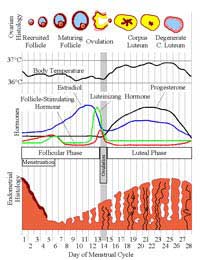Tracking Your Ovulation

One handy way of assessing your fertility is to get in tune with your menstrual cycle. By learning to track your ovulation, you can improve your chances of getting pregnant. Here’s how.
Each time you ovulate, your body releases a mature ovum, or egg, from your ovaries. If you have sex around the same time, the egg will be in a prime position to be fertilised by sperm and for you to become pregnant. Ovulation usually occurs every four weeks, about 14 days before the start of your next menstrual period, and normally only one egg is released at a time.
The uterine lining will have built up ready for implantation, but if the egg isn’t fertilised by sperm, it will be discarded in the usual way and your period will arrive about two weeks later. It’s a very narrow time period, as it only lasts for 12 to 24 hours and conception is only possible during this phase.
Sometimes what’s called an anovulatory cycle, where an egg isn’t released, happens. It’s difficult to know when this has happened, as you still get a period even though you haven’t ovulated.
If you’re keen to get pregnant, getting to know your body and when you’re likely to be ovulating can be a helpful way of timing when’s best to have sex. There are various methods used to do this and they can either be used on their own, or in conjunction with each other.
In the first instance, a simple method you can develop yourself is to create an ovulation calendar. This can be done by simply using a diary, or you can create a chart. Keep note of your menstrual cycle, by noting down the start and finish of your period each month. If you’ve got a relatively regular cycle, this will be much easier to do.
You normally ovulate in the middle of your cycle, so as you get to know your cycle, you can estimate when you’re likely to be ovulating. For an even better result, you can combine your chart with the methods below.
Ovulation Calculator
It’s possible to purchase an ovulation calculator or predictor kit which will predict when you’re about to ovulate, or are already ovulating. It works by detecting an increase in the Lutenizing Hormone (LH) in the urine, or an LH surge. LH is released from the pituitary gland, triggering a rise in oestrogen which in turn causes an egg to be released from the ovum and into the fallopian tubes. It usually occurs about 24 to 36 hours before ovulation, so it’s a useful signal to have.It’s a simple test that only needs to be carried out when you’re mid-cycle, but it’s not foolproof. It doesn’t always work for women who have irregular cycles and, if you’re taking fertility drugs, they may interfere with the results.
Charting Your Basal Body Temperature
Before you ovulate, your average body temperature is 97.0 to 97.5 degrees Fahrenheit, but when you’re ovulating is increases by about 1-2F. Although it doesn’t seem like much of an increase, this change can be tracked and may help you when you’re trying to predict when ovulation will occur. The change in temperature is due to the release of the hormone progesterone and your temperature will stay elevated until your next monthly cycle begins, then go back to normal (unless you get pregnant, when it will continue).In order to track your basal body temperature, you need to start taking your temperature on the first day of your period and take it every day at the same time. It’s best to do it first thing in the morning, before you’ve moved around, showered or eaten breakfast, and to use an oral thermometer. Your readings may seem random for a while, but after a month or two you begin to notice a pattern. The method isn’t 100% accurate, but it has been used for years and is easy and free to try.


Re: Ultrasounds - What is EFBW and GMS?
My wife is 32.6 weeks ...and the babys weight is 1971gms...is that normal or not...please reply me.....
Re: Ultrasounds - What is EFBW and GMS?
my 18th week and baby weight 252 it is gud or bad...please tell me....
Re: Ultrasounds - What is EFBW and GMS?
Hello!i have 21 weeks and 4 days pregnancy.. and my EFBW is 430gms.. is that normal?? Will my baby healthy or not??
Re: Abdominal and Pelvic Pain During Pregnancy
Left pelvic pain, backpain pregnency positive' is any problem, already ectopic happen
Re: Ultrasounds - What is EFBW and GMS?
My wife is 21 week 2 day . In scan report EFRW 415 GM is normal or not . Can you please help me to know current status of…
Re: Ultrasounds - What is EFBW and GMS?
I am 34.1wks pregnant my baby weight is 2215gm is my baby healthy
Re: Ultrasounds - What is EFBW and GMS?
My wife is 37weeks 5days pregnant E.F.B.W - 3010 grams how is she
Re: Ultrasounds - What is EFBW and GMS?
I am pregnant of 36 week 2 days and my EFBW is 1949 is it normal..?
Re: Ultrasounds - What is EFBW and GMS?
i had my ultrasound rhis sept 19 i wonder what is rhis number for efbw 2336 stands fir can you please give me an idea…
Re: Ultrasounds - What is EFBW and GMS?
my wife is 16.2 weeks and done early tiffa scan. E/O an elongated anechoic lesion with minimal internal echogencity…